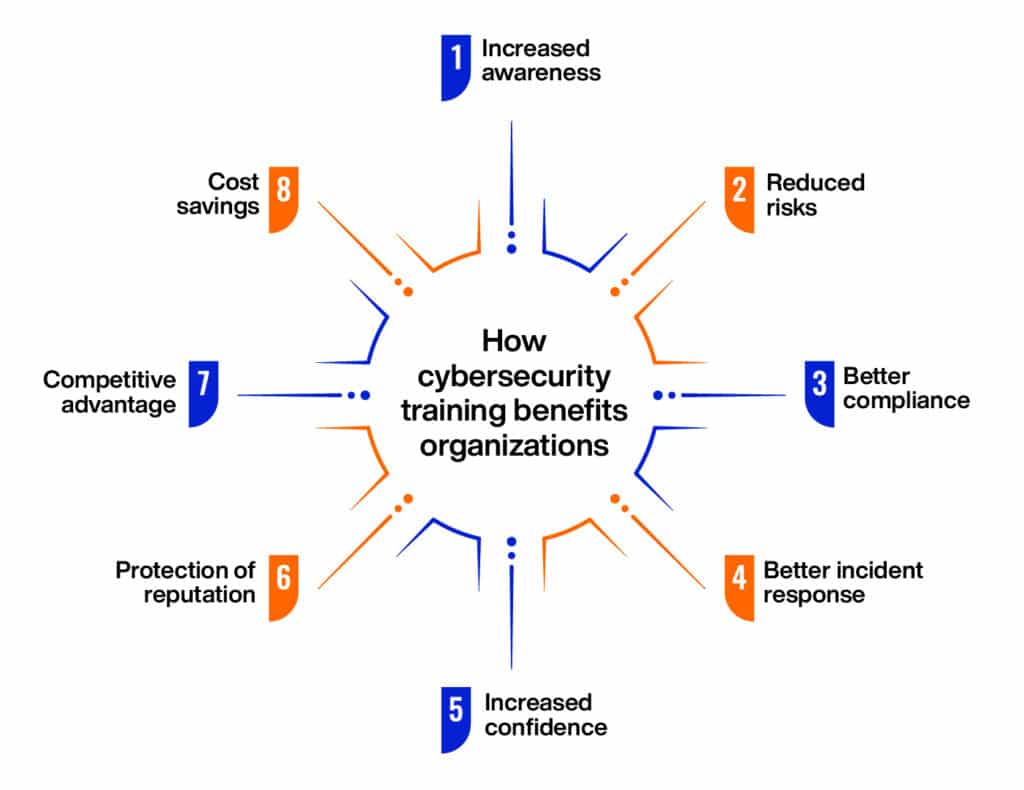Listen to this blog
Cybersecurity includes a range of tools and methods built for securing advanced frameworks from unauthorized access and cyber threats. This is vital due to the expanding amount of sensitive information transmitted electronically, highlighting the need for strong assurance measures.
Cyber attacks such as malware, phishing, and ransomware can pose noteworthy dangers to organizations’ operations, funds, and reputations. Thus, following controls related to information security is vital to avoiding negative repercussions and maintaining trust.
BCA/MCA students must be able to recognize common cybersecurity threats, be capable of using security devices, and understand cybersecurity basics for tech students.
Also read: How to become a Network Security Engineer with a BCA degree
The 5 C’s of Cybersecurity
In the computerized age, safeguarding information is vital, particularly for tech students who are at the forefront of creating and overseeing innovation frameworks. Cybersecurity is a broad topic that involves various guidelines and practices to protect digital assets from online threats. Let’s break down the 5 C’s of cybersecurity.
Change
By change, we mean the active nature of cybersecurity threats and the consequent countermeasures. Cyber threats are rapidly evolving; therefore, the constant adaptation of security measures is essential. Students must, therefore, stay up-to-date on the latest developments in cyber threats. It is equally essential to constantly update computer software and address any new vulnerabilities that may arise.
Continuity
Continuity accentuates the significance of keeping up reliable cybersecurity measures to guarantee continuous assurance. Tech students ought to create strong cybersecurity arrangements and reinforcement procedures to relieve the effect of cyber assaults and guarantee information accessibility and integrity.
Cost
The cost element reflects the monetary expenditure on cybersecurity measures and the associated potential costs of cyber assaults. Tech students must advocate for satisfactory budget requirements for cybersecurity activities and organize cost-effective security measures to diminish the possibility and impact of cyber attacks.
Compliance
Compliance highlights the significance of following administrative regulations and industry measures related to cybersecurity. Tech students ought to guarantee their organizations comply with pertinent cyber laws and controls by executing suitable security controls and remaining educated about changes in regulations.
Coverage
Coverage indicates the scope or degree of authority that cybersecurity measures have over an organization’s operations. Tech students ought to embrace a comprehensive approach to cybersecurity by guaranteeing that cybersecurity measures cover all perspectives of their organization’s operations.
In conclusion, by understanding and executing the 5 C’s of cybersecurity, tech students can secure information viably and moderate the dangers of cyber assaults.
You can also check top industries to work in after MCA
Cyber Threats Awareness for Students: Importance and Best Practices

In today’s interconnected world, cyber challenges pose noteworthy dangers to people, organizations, and society as a whole. For tech students, cybersecurity mindfulness is not just an in-demand skill—it’s a modern requirement. Here’s why it’s significant, along with the do’s, don’ts, and tips on working securely:
Importance of Cybersecurity Awareness in Education
- Prevention of Cyber Assaults: Cybersecurity awareness empowers students to identify and mitigate potential cyber threats before they escalate. By familiarizing themselves with common attacks like phishing emails, malware, and social engineering, students can enhance their own security and that of their organizations.
- Protection of Individual and Delicate Data: Students frequently handle individual and delicate data in their academic and professional endeavors. Cybersecurity mindfulness can significantly increase their capability of shielding this information against unauthorized access or theft.
- Agility in Workspace: Students who understand cybersecurity best practices will be better able to adjust and react swiftly to any emerging dangers as the digital landscape continues to change. Since businesses respect workers who can effectively manage and mitigate risks, this agility in the workplace may give students a competitive edge in their careers.
Do check our other blog about the power of specialized degrees like MCA
Best Practices for Ensuring Safe Cyberspace
Implementing compelling cybersecurity strategies is fundamental for shielding your advanced resources and individual data. Here are a few key strategies to follow:
- Routinely upgrade working frameworks, applications, and antivirus programs to fix known vulnerabilities and fight rising threats.
- Be cautious when clicking on links or downloading attachments in emails, messages, or social media posts. Confirm the sender’s authenticity and avoid sharing delicate data online.
- Avoid visiting suspicious websites and downloading records from untrusted sources.
- When accessing delicate data online, utilize secure associations (HTTPS).
- Empower gadget encryption, utilize screen locks, and install virus detection software on smartphones, tablets, etc., to prevent burglary or loss.
- Routinely back up imperative information to an outside drive or cloud capacity service.
- Don’t share passwords or sensitive data with anybody.
- Don’t overlook security notices or prompts on your gadgets or program applications.
By following the above guidelines and working safely, students can contribute to a more secure, advanced environment.
Career in Cybersecurity for BCA/MCA Graduates
For BCA/MCA graduates, proficiency in cybersecurity provides an opportunity to apply their technical skills in safeguarding digital infrastructures. Here are 7-8 career paths directly related to cybersecurity, along with their average salaries:
Cybersecurity Analyst
Role: Cybersecurity analysts oversee network traffic, address security incidents, handle security software, write incident response reports, install security software, establish information security best practices, research threats, and perform regular risk assessments and penetration testing. These activities ensure the safeguarding of confidential organizational data.
Salary: Entry-level positions may start around ₹60,000 per year, while experienced professionals can earn upwards of ₹5.9 lakhs annually.
Security Consultant
Role: A security consultant examines and evaluates security systems and precautions to safeguard organizations from possible security breaches. They are tasked with testing assets, recognizing threats, creating and executing security protocols, collaborating with teams, holding client meetings, performing risk assessments, creating countermeasures, presenting findings, keeping informed on the newest security systems, and educating staff on identifying and protecting against security breaches and risks.
Salary: The average base salary is ₹9.3 lakhs annually, depending on experience and expertise.
Penetration Tester (Ethical Hacker)
Role: The ethical hacker evaluates a company’s digital security measures. They assess the system’s stability, pinpoint flaws, and conduct risk evaluations. Ethical hackers adhere to rigorous rules, concentrating on finding weaknesses and enhancing security strength. They offer thorough reports outlining identified vulnerabilities, risks, and suggestions for mitigation.
Salary: Entry-level salaries start at around ₹70,000 per year, with experienced penetration testers earning over ₹7.6 lakhs annually.
Incident Responder
Role: Incident reporters serve as an organization’s initial defense system. They detect, examine, and address security breaches within companies. Monitoring systems and intrusion detection systems are utilized for detecting incidents. Immediate action is taken to contain and mitigate the incidents, followed by forensic analysis and collaboration with teams to improve security.
Salary: Average base salaries range from ₹2.6 lakhs to ₹27.8 lakhs per year, depending on experience and organizational size.
Security Engineer
Role: A security engineer plays a vital role in protecting an organization’s digital assets. They implement security measures, assess risks, focus on network security, respond to incidents, manage vulnerabilities, and maintain documentation.
Salary: Entry-level security engineer positions may offer salaries starting at ₹65,000 per year, while experienced engineers can earn over ₹9.8 lakhs annually.
Cryptographer
Role: A cryptographer is a specialist in data security who is skilled in encryption techniques. They devise codes and algorithms to protect computer systems, decipher information, evaluate current encryption methods, work with groups, and develop algorithms for businesses’ systems, maintaining confidentiality, integrity, and authenticity.
Salary: Salaries for cryptographers typically range from ₹3 lakhs to ₹20 lakhs per year, depending on experience and industry.
Security Operations Center (SOC) Analyst
Role: A security operations center (SOC) analyst is essential for a company’s cybersecurity defense. They watch for and identify possible dangers, work together with departments, spot sketchy behavior, and enforce security protocols and top practices. Their main objective is to stop attacks by detecting suspicious behavior and implementing necessary actions. They collaborate with their team members to ensure a safe operating environment.
Salary: Entry-level SOC analyst positions may offer salaries starting around ₹2.5 lakhs per year, with experienced analysts earning up to ₹15,00,000 annually.
Forensic Analyst
Role: A forensic analyst examines digital evidence related to cybercrimes and security breaches. They gather and assess information from different sources, react to security breaches, preserve evidence accuracy, and offer professional advice.
Salary: Average salaries for forensic analysts range from ₹3 lakhs to ₹6 lakhs per year, depending on experience and specialization.
Start your career with Online Manipal
Start your career in cybersecurity for BCA/MCA with Online Manipal, a trusted stage for quality instruction and professional advancement. MUJ (Manipal University Jaipur) offers online BCA and MCA programs, giving learners a strong foundation in computer science and data innovation. By selecting MUJ’s online BCA and online MCA program, students can secure basic aptitudes such as programming, database administration, organizing, and data security. These programs offer an adaptable learning environment, permitting students to balance their studies with other commitments.
Conclusion
Cybersecurity basics for tech students are essential to exploring the tech scene safely. Understanding concepts like encryption, confirmation, and control shapes a solid foundation. Recognition of common cyber risks enables students to distinguish and moderate dangers successfully. Enabled with cybersecurity basics, BCA/MCA students contribute to shielding computerized assets’ confidentiality, accuracy, and accessibility.
Key Takeaways:
- Staying up to date with recent security advancements as well as security threats provides students with the necessary agility for career growth.
- BCA/MCA courses at MUJ can equip students with a strong cybersecurity foundation.
Prepare for your next career milestone with us













